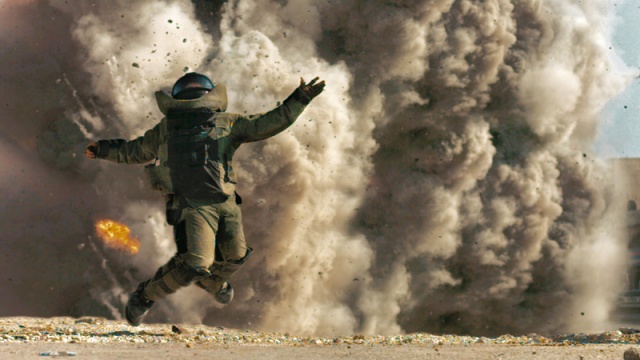
Movie Review: The Hurt Locker
At a screening of the Hurt Locker that I paid to attend on the west side of Manhattan, where people tend to deal with war only if the New York Times says its OK, the 1 pm showing was full. This is one feature about the war in Iraq that may actually get an audience.
Kathryn Bigelow presents war as constant sequel to itself. The Hurt Lockers about a bomb squad, made up of regular guys – Sanborn (Anthony Mackle), an earnest black sergeant counting the days left in-country; James (Jeremy Renner), a cocky bomb expert who fills a special anti-explosive suit when the previous expert gets blown up; and Eldridge (Brian Geraghty), a pudgy anxious corporal. There are others, most of whom end up shot.
Barry Ackroyds camera follows James and Sanborn as they patrol dusty city streets where any scrap of litter could be a bomb, and some people on the street watching the soldiers know just where those bombs are. (Iraq is clearly an entirely different climate, but the Vietnam War parallels of guerrilla warfare against an ever-present civilian–on whose side?- -stare you right in the face.)
Here, every minute can be an eternity, and the team has 38 days left in Iraq on this rotation. Bigelow puts you so close to her actors that she makes you imagine you feel just about everything that they do.
Why did we have to wait for so long to get this kind of closeness to one real experience of war, from a film?
The other more immediate media (a few of which, to be fair, have been just as unblinking as The Hurt Locker) have minimized the life and death horror of daily patrols in their coverage, and certainly stayed away from anything as volatile as bomb-defusing.
George W. Bush knew that daily coverage of soldiers returning in body bags would turn the public off to the war. So television and most newspapers know that the life-threatening routine of war (for which most Americans arent making physical sacrifices) will get viewers to turn the channel away. Audiences and advertisers felt the same way about having the effects of war televised.
Now film critics have decided that Bigelows soldiers are the real deal – brave, dutiful, tough, and vulnerable. (One warning: beware of film critics holding forth on ballsiness.
The script by Mark Boal, who was embedded in Iraq with US soldiers, reflects what must have been some grim moments disarming bombs and watching soldiers living with fear once they climbed into a vehicle and began a patrol.
Somethings odd here, though. The language is far less profane than any that Ive heard from enlisted men. While the dialog tames the experience, the realities of dealing with a swaggering partner who might get you killed are laid out honestly in a scene where Sanborn and Eldridge consider killing James as he looks through a blast site for a lost pair of gloves.
In another special moment, the squad comes across new vehicles and armed men in Arab dress. Before a firefight starts, the “Arabs” turn out to be British contractors. While the Brits and Americans from the “coalition of the willing” determine who each other are, real Arabs get the allies in their sights. Several are killed. The romantic kinship of Brits helping Arabs seek liberation of Lawrence of Arabia, you might say, is so September 10th.
These soldiers are part real, and part iconic. War here is only tactile, keeping yourself and your buddies alive – no politics, no Iraqis to befriend except the street kid who wants to sell you a dvd, no thinking about anything more than the next step, the next day, and eventually returning to your family.
Has Kathryn Bigelow boiled the ocean, told us everything about war? Not at all. One basic truth about war is that it is fought for reasons beyond the control of most of the men fighting it. Thats why soldiers end up viewing it the way they do — you just do your time and make sure that you and your buddies get back alive.
Well have to wait for another movie about those bigger questions.
